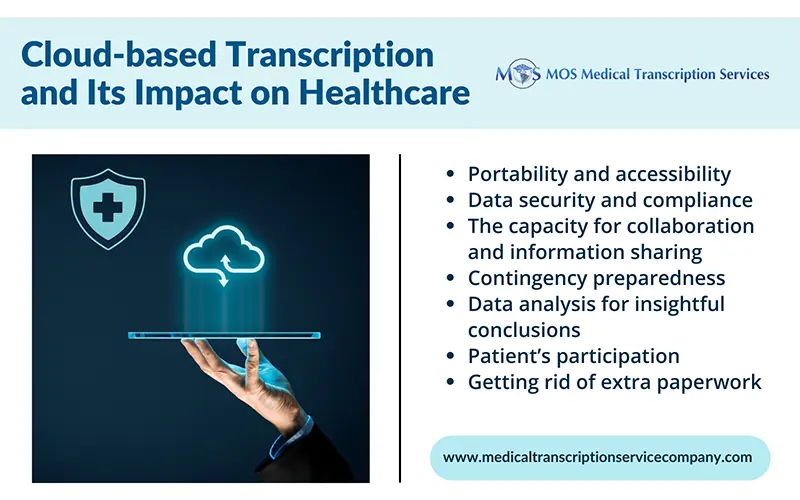
Table of Contents
Cloud-based medical transcription services have technically been around ever since the development of this field, as this blog reveals. But the move towards electronic health records has altered the environment slightly. The complexities of EHR transcription make comprehensive cloud-based medical documentation pretty useful for practices.
What is needed is a flexible and secure platform for accommodating various clinical documentation requirements and workflows to serve the needs of hospitals and practices. The technology must be cost-effective and centralized to ensure better performance and security.
What Is an EHR That Is Cloud-based?
A cloud-based electronic health record (EHR) offers reduced upfront costs, easier scalability, flexibility, and user-friendliness than an on-premises system. Data mining allows managers to look at patient data to identify trends in behavior, drug interactions, and other potential health risks, as well as to assess workflows to identify opportunities for improvement.
In order to better customize the solution to the particular requirements of different doctors and hospitals, the majority of contemporary web-native solutions were created in cooperation with healthcare providers, clinicians, and facility management teams.

The Shift to Cloud-based Electronic Health Record (EHR) Systems
Grand View Research projects that the size of the global market for cloud-based electronic health records would reach USD 79 billion by 2027. Cloud-based EHR systems have completely changed how patient data is distributed, stored, and retrieved.
Here is how these systems impact the healthcare system:
- Portability and accessibility: The main factor that makes cloud-based electronic health record systems convenient is their easy availability. Medical professionals can now access protected patient data from any location with an internet connection. The healthcare system has undergone a significant transformation as a result, becoming more flexible and effective than previously. Better remote patient care is now possible since doctors may access and update patient data from any location.
- Data security and compliance: Secure encryption, restricted access, and backup procedures are just some of the measures cloud-based EHR systems take to protect private patient information. Additionally, they keep an eye on legislative modifications that facilitate healthcare organizations’ compliance management.
- The capacity for collaboration and information sharing: The medical industry has long struggled with interoperability. Cloud-based EHR system enhancements have contributed to the resolution of this problem. By facilitating the interchange of patient information among several healthcare systems and specialists, they enable anytime, anywhere access to critical data. Having such tightly linked systems is crucial for reducing administrative tasks and offering all-encompassing care.
- Contingency preparedness: A basic element of cloud-based EHR systems is disaster recovery. Frequent backups of data to safe off-site locations reduce the risk of data loss due to unforeseen events. In the case of a natural disaster or system failure, medical personnel can quickly restore patient information and carry on with treatment.
- Data analysis for insightful conclusions: Cloud-stored healthcare data can be subjected to advanced analytics. Big data can be used by healthcare organizations to identify trends and use them to enhance patient outcomes and operational efficiency. These discoveries may improve healthcare by enabling individuals to make more informed decisions.
- Patient’s participation: Cloud-based EHR systems frequently provide patient portals where patients may view their health records, schedule appointments, and communicate with their physicians online. Research demonstrates that when individuals take an active role in their own treatment, everyone benefits.
- Getting rid of extra paperwork: It’s common for healthcare professionals to devote a significant amount of time to administrative tasks including insurance claims processing, appointment scheduling, and billing. These processes are streamlined by the combination of cloud-based EHR systems and practice management software, allowing medical professionals to focus on patient care rather than paperwork.
The Role of AI and Automation in Cloud-based EHR Transcription
The application of automation and artificial intelligence (AI) to cloud-based EHR transcription is an interesting new development. Significant advancements in speech recognition technology have made it possible for AI to handle some transcription duties. Artificial intelligence (AI) can expedite the process, cutting down on turnaround times and allowing healthcare practitioners to access patient records more quickly, even though human transcriptionists are still crucial to maintain accuracy.
Intelligent data organization is another benefit of automation, as the system can automatically tag and classify transcriptions according to their content. This facilitates the quicker and easier finding of specific patient information.
The efficiency, accuracy, and security that cloud-based EHR transcription offers is expanding into new areas. Medical transcription services have grown more scalable and accessible by utilizing cloud technologies, satisfying the constantly expanding needs of contemporary healthcare facilities. The way patient data is recorded and handled is being revolutionized by cloud-based EHR transcription due to the incorporation of artificial intelligence, real-time accessibility, and improved collaboration. Adopting cloud-based medical transcription services is a critical first step for healthcare providers planning to improve their documentation procedures and move toward a more efficient, secure, and simplified future.


